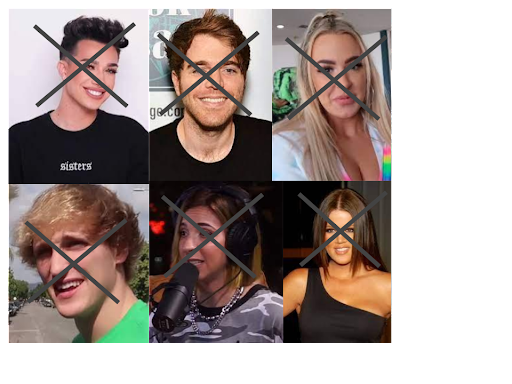The flaws of cancel culture

Photo courtesy of Anne Foote
The celebrities above have been canceled but still are famous and prominent figures in pop culture. They remain to influence teens even though they have made a multitude of harmful mistakes.
The Cancel Culture bandwagon has swept across social media, producing naive notions of being held accountable and attempting to devastate careers while lacking actual effectiveness or proof of concept.
“Cancel culture mainly does the opposite of what it’s meant to do. It brings attention to the people that are being called out, meaning they are getting more publicity and more money. All of the likes, comments, and interactions give artists more clout,” said junior Ana Villa Ogliastri. “I don’t think people realize that if you’re gonna cancel someone, don’t talk about them.”
The concept of Cancel Culture stems from ostracizing people because of their actions or words and is most prominently executed on social media. Notable celebrities like Shane Dawson, JK Rowling, Logan Paul and many others have all been victims of the Cancel Culture train.
The process of Cancel Culture seems simple enough. These celebrities have made mistakes, some minor and some major, and they should face the consequences of their actions. But does Cancel Culture actually hold people accountable? And does it allow any room for growth and improvement?
“Cancel culture doesn’t educate anymore; it does the opposite. Instead of educating people and letting them grow, it just turns into sending people death threats. It’s not canceling and people aren’t doing it for a good cause anymore. Fans want celebrities to feel sorry just for the sake of feeling sorry, not because of their actions,” said Ogliastri.
Due to online viewers’ obsessive tendencies and short attention spans, most people who are canceled often face the consequences of being canceled for only a few weeks or until everything blows over. After the dust has settled, these celebrities go back to normal like nothing happened. Cancel Culture has no strict guidelines, so the implications vary greatly from circumstance to circumstance.
“I feel like Cancel Culture depends on situations but people that have bigger fandoms like Ariana Grande fans, Swifties, and really big male artists all have fandoms that baby them and don’t allow them to get called out for their actions,” said Ogliastri. “So then it turns into picking and choosing who should and shouldn’t be canceled since the fans don’t let their artists get called out. If you’re gonna cancel someone, it shouldn’t matter how famous they are.”
Shane Dawson was canceled during the pandemic when racist jokes, inappropriate comments towards minors, and a list of other inexcusable actions were exposed to the public. He was canceled and ostracized from the makeup community and YouTube community after online viewers tarnished his name. Although his cancellation is one of the largest to occur on social media, only a year later Dawson still has 20 million followers on YouTube and 8.1 million followers on Instagram. Dawson still has fame, followers, and money. So what did the cancellation do? There is no way for the public to truly know if he improved as a person and understood his mistakes.
A celebrity’s character improvement can not be accurately documented or observed from viewers, so the claim that Cancel Culture holds people accountable doesn’t describe the actual effects of Cancel Culture.
Consequently, Cancel Culture has simultaneously been somewhat successful in persuading companies to actively remove problematic people and symbols from society. Aunt Jemima, the previous logo and name for the Pearl Milling Company syrup that is owned by Quaker Oats, was removed from the bottle as the cartoon perpetuated racial stereotypes. In these circumstances, Cancel Culture is successful at improving communities. Although, more often than not, the effects of Cancel Culture aren’t tangible items therefore the success cannot be determined.
“Being canceled fizzles away after a lot of time and people just move on to the next person,” said junior Ella Russell.
Cancel Culture’s lack of holding people accountable stems from the bandwagon practices that parallel it. When a celebrity gets canceled publicly, more and more viewers start to cancel the celebrity even if they aren’t fully aware of the facts of the situation.
“Canceling people can become a trend so everyone hates this one person but they don’t have a valid reason,” said Russell.
Cancel Culture is an attempt at holding people accountable for their actions but is a practice that has varied success.





